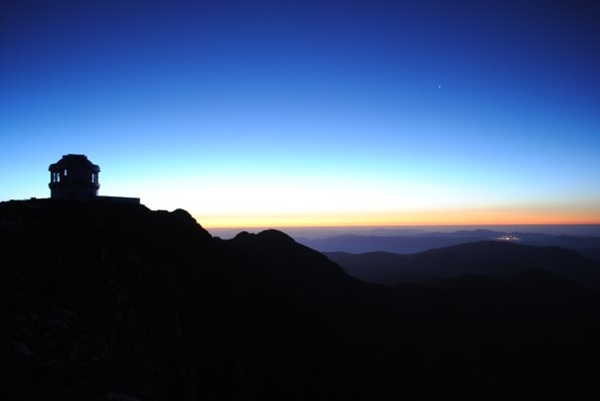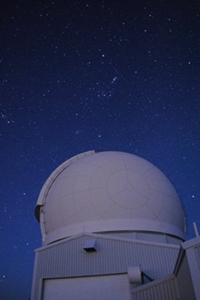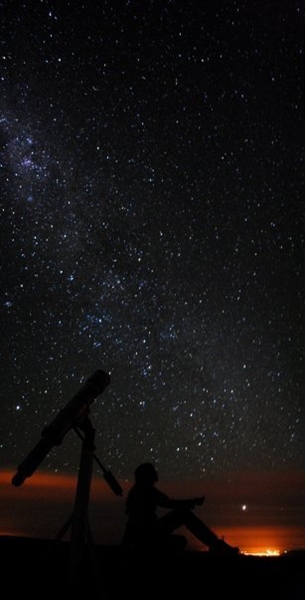Report
by Amee Hennig
I was having a Single-Serving Friend conversation on a plane ride (like in Fight Club, but not leading to such dire events) leaving Washington D.C. after a conference and it was getting heated. Naturally, having a habit of talking to everyone falling under my radar I had begun a conversation with the man next to me. He asked a common question of someone of my age, “What do you want to do after you finish college?” and the roller-coaster ride of answering that question began leading to a red-faced fellow sitting next to me.

Sunset from Cerro Pachón in Chile with the Gemini telescope to the left, a small city on the right, and Jupiter above.
My answer, “I want to fight light pollution.” A disgruntled huff followed the statement of one of my life’s goals, a waste in his mind.
This evolved over a long process of searching, beginning at age 7. I saw the Milky Way and in no way could understand what it was or why it appeared only far out in the country. I didn’t see it again until college when I lived and worked at the McDonald Observatory in West Texas for three months. Sometimes it was so bright I could walk, easily, just by its light.
 Upon my return to the university you might say I experienced something along the lines of culture shock. Being disconnected so suddenly from the view and experience I had grown used to and attached to was crushing. Disheartening to the point that I immediately applied to work at a second observatory in Chile, the Cerro Tololo Inter-American Observatory. I spent one semester at college and immediately packed up a second time to fulfill my lifelong dream of seeing the southern stars.
Upon my return to the university you might say I experienced something along the lines of culture shock. Being disconnected so suddenly from the view and experience I had grown used to and attached to was crushing. Disheartening to the point that I immediately applied to work at a second observatory in Chile, the Cerro Tololo Inter-American Observatory. I spent one semester at college and immediately packed up a second time to fulfill my lifelong dream of seeing the southern stars.
Realizing that so many people had never even seen, felt, or experienced this I knew I had to share it. I worked as an astronomy education intern at the National Air and Space Museum. I even helped run a star party in the middle of the city, and we saw what we could see, which wasn’t much. Knowing that each child who came had probably never seen the stars I knew were there broke my heart. I had to do something about it. The International Dark-Sky Association gave me the opportunity to spend my time fighting to bring back the stars and so much more.
Now I see that we are just blinded by, well, the light of our own creation. Light Pollution may be very different from the other types of pollution everyone is used to but it has an effect on almost ever aspect of our daily lives and we hardly notice.
In a world continually searching for sustainable options light has been ignored. However, slowly, but surely, we have begun to notice the consequences. Fireflies have begun to disappear, baby sea turtles are found dead on the beach under bright lights, birds and insects circle bright light sources until we find their bodies in the morning, breast cancer rates have slowly but surely been rising, and increasing generation after generation is slowly forgetting that a starry sky even exists at all.
It  is hard to know something needs protecting when you can’t see it, and that’s what light pollution does. It has disconnected us from a sky that has inspired human innovation and creation since we first thought to look up. IDA’s mission is to “preserve and protect the nighttime environment and our heritage of dark skies through environmentally responsible outdoor lighting.” It is not to turn all the lights off and wander around aimlessly, rather it is to be smart about it. We want to improve our lighting and make it better for our health, our safety, and even our wallets among many other benefits.
is hard to know something needs protecting when you can’t see it, and that’s what light pollution does. It has disconnected us from a sky that has inspired human innovation and creation since we first thought to look up. IDA’s mission is to “preserve and protect the nighttime environment and our heritage of dark skies through environmentally responsible outdoor lighting.” It is not to turn all the lights off and wander around aimlessly, rather it is to be smart about it. We want to improve our lighting and make it better for our health, our safety, and even our wallets among many other benefits.
I argue that it is a pollution with a simpler solution. Whereas other pollutants are only reversed through lengthy and costly processes along with many years for recovery to take effect light pollution is combated and reversed as easily as flipping a switch, literally. Downward facing lights put the light where it is needed. Motion sensors and timers turn the light on only when it is needed. And with all that light going to all the right places we don’t even need to blast ourselves with the highest wattage possible.
I do hope that my friend from the plane might one day cross this Dark Skies Blog and stop a moment reminiscing, “Is this what that funny girl was talking about on the plane?” I hope he stops a moment, reads, and wonders, “Is that all it is?” and then I hope he goes outside, looks up, turns off a light, and keeps on at it. And I hope upon reading this your curiosity will be piqued and you will keep on with us as we write this blog. There is something beautiful up there and all we need to do is turn off a light and look up. It really is as simple as that.
###
 Amee Hennig is a writer & program manager at the International Dark-Sky Association. She works with parks, reserves, communities, and people around the world to promote dark sky awareness and add to the International Dark Sky Places. Amee graduated from the University of Arkansas with a B.S. in physics and English, creative writing. While in college Ameé did research at the University of Arkansas, McDonald Observatory in West Texas, Cerro Tololo Inter-American Observatory in Chile, and also worked as an astronomy education intern at the Smithsonian National Air and Space Museum. Follow her on Twitter @AstropoetAmee and Facebook and visit her blog.
Amee Hennig is a writer & program manager at the International Dark-Sky Association. She works with parks, reserves, communities, and people around the world to promote dark sky awareness and add to the International Dark Sky Places. Amee graduated from the University of Arkansas with a B.S. in physics and English, creative writing. While in college Ameé did research at the University of Arkansas, McDonald Observatory in West Texas, Cerro Tololo Inter-American Observatory in Chile, and also worked as an astronomy education intern at the Smithsonian National Air and Space Museum. Follow her on Twitter @AstropoetAmee and Facebook and visit her blog.
My Recent Reports
Contact
| Location: | Sri Lanka  |
|---|---|
| Website: | thilinaheenatigala.blogspot.com |







Comments